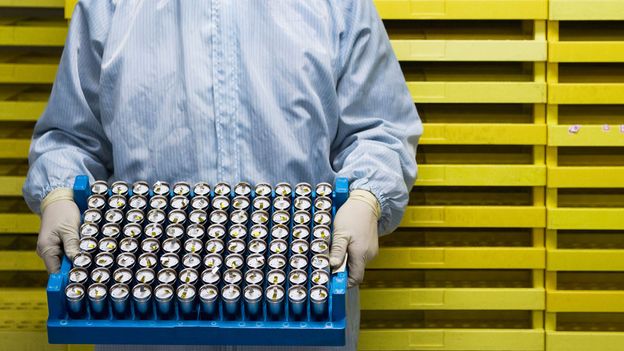
“It’s completely game-changing,” says Sophie Osbourne, one of the team working on the project with Scott. “For so long we’ve collected nuclear waste, and now we’re no longer talking about long-term storage but actually repurposing it to make electricity.”
While chemical batteries like lithium-ion don’t fare well in high temperatures, these durable diamond batteries have the ability to work in the most challenging environments where it is hard to slip in a replacement, such as in space, at the bottom of the ocean, or perhaps at the top of a volcano. They would be perfect for keeping satellites and computerised sensors running, for example.
“The batteries are absolutely tiny,” says Scott. So far, the researchers have been able to generate diamond batteries that produce 1.8 volts – similar to an AA battery – although it has a much lower current. They are technically rechargeable too, but would require a few hours inside a reactor core to reach their original output, says Scott. Although the steady trickle of current created as the radioactive material decays means they will emit electricity for an incredibly long time – carbon has a half-life of 5,730 years.
Despite being made from diamond, they are unlikely to be that expensive either. “You’d be surprised how little man-made diamonds can cost,” Scott says.
In the next decade or two, Scott believes we could even start to see ultra-long-lasting diamond batteries appear in our homes, perhaps in smoke alarms or TV remotes, or in medical applications like hearing aids or pacemakers.
We may never have to struggle to replace the failing battery in a smoke alarm at the dead of night again.
--
Join one million Future fans by liking us on Facebook, or follow us on Twitter or Instagram.
If you liked this story, sign up for the weekly bbc.com features newsletter, called “The Essential List”. A handpicked selection of stories from BBC Future, Culture, Worklife, and Travel, delivered to your inbox every Friday.
"fruit" - Google News
July 24, 2020 at 02:00PM
https://ift.tt/3f3dOo7
How the world's smelliest fruit could power your phone - BBC News
"fruit" - Google News
https://ift.tt/2pWUrc9
https://ift.tt/3aVawBg
Bagikan Berita Ini














0 Response to "How the world's smelliest fruit could power your phone - BBC News"
Post a Comment